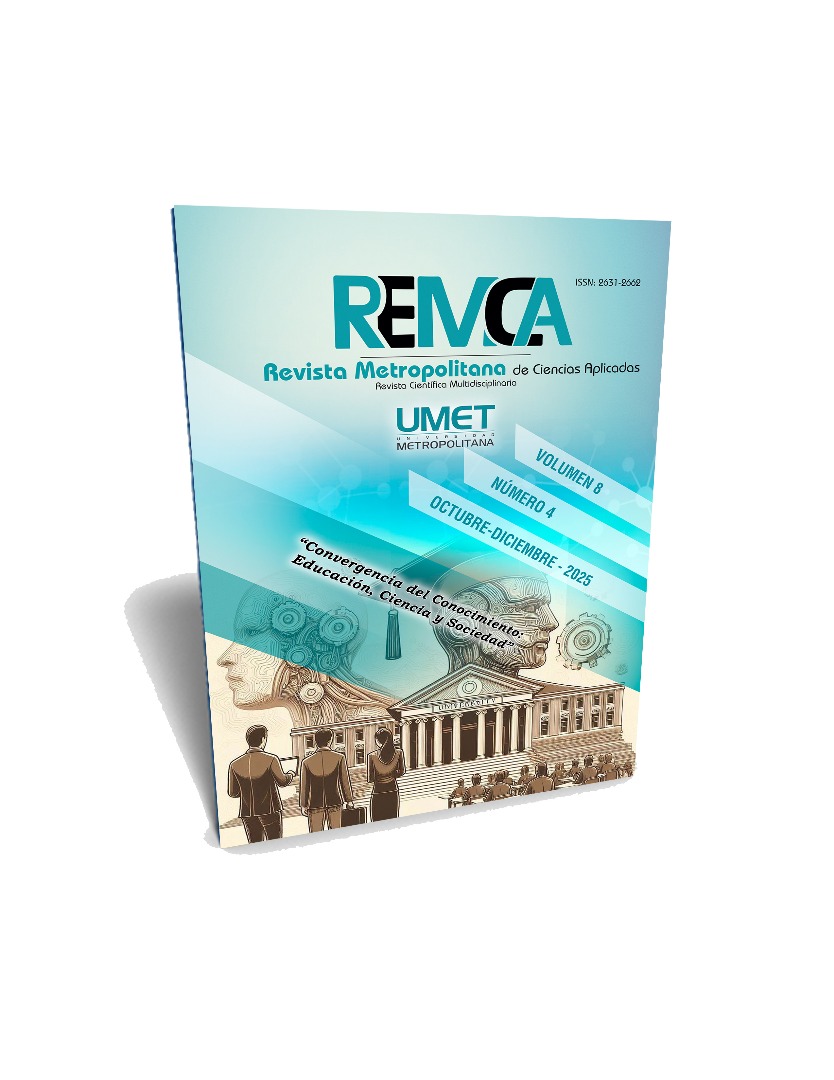Active learning strategy in emotional regulation in secondary school students
DOI:
https://doi.org/10.62452/db4mwj32Keywords:
Emotional regulation, active learning, socio-emotional education, middle basic educationAbstract
This study aims to evaluate the effectiveness of an active learning strategy designed to strengthen emotional regulation in a group of 28 fifth-year middle school students from Unidad Educativa 21 de Septiembre in Esmeraldas, Ecuador. A mixed-methods approach was implemented, combining a quantitative-descriptive design with qualitative analysis under a pretest–posttest scheme. Data collection was carried out through validated emotional self-regulation questionnaires and classroom observation records, allowing for triangulation of findings. The pedagogical proposal focused on cooperative dynamics, guided reflections on emotional experiences, and active activities aimed at enhancing awareness, self-regulation, and emotional self-control. The results revealed significant improvements in the identification, expression, and management of emotions, as well as an increased willingness of students to face school situations constructively. Furthermore, a positive correlation was observed between enhanced emotional regulation and academic performance, consistent with international studies highlighting the effectiveness of social-emotional learning (SEL) programs in adolescents. These findings support the relevance of incorporating active learning strategies into educational policies and practices as effective tools to promote students’ socio-emotional well-being in urban contexts, where learners face multiple challenges. In this sense, the proposal represents a meaningful contribution to the consolidation of a more inclusive, resilient, and holistic education, focused on the integral development of students.
Downloads
References
Bandura, A. (1977). Teoría del aprendizaje social. Prentice Hall.
Bisquerra Alzina, R. (2003). Educación emocional y competencias básicas para la vida: El modelo pentagonal de competencias emocionales. Revista de Investigación Educativa, 21(1), 27 52. https://congresointeligenciaemocional.com/wp-content/uploads/2018/12/Bisquerra_R_Educacion-emocional-y-competencias-2003.pdf
Burgin, X., Coli, S., & Daniel, M. C. (2021). Exploratory study of Ecuadorian teachers’ understanding of social emotional learning: An examination of primary school teachers. GIST – Education and Learning Research Journal, 22, 125–146. https://doi.org/10.26817/16925777.964
Campos-Gómez, A. A. del C., Peralta-Jiménez, Y., & Romero-Aguirre, G. de los Á. (Coord.). (2025a). Retos actuales de la salud mental y trascendencia social. Sophia Editions.
Campos-Gómez, A. A. del C., Peralta-Jiménez, Y., & Romero-Aguirre, G. de los Á. (Coord.). (2025b). Retos actuales de la salud mental y trascendencia social. Sophia Editions.
Fuentealba-Urra, S., Rubio, A., González-Carrasco, M., Oyanedel, J. C., & Céspedes-Carreno, C. (2023). Mediation effect of emotional self-regulation in the relationship between physical activity and subjective well-being in Chilean adolescents. Scientific Reports, 13(1), 13386. https://doi.org/10.1038/s41598-023-39843-7
Green, A. L., Ferrante, S., Boaz, T. L., Kutash, K., & Wheeldon Reece, B. (2021). Social and emotional learning during early adolescence: Effectiveness of a classroom based SEL program for middle school students. Psychology in the Schools, 58(6), 1056–1069. https://doi.org/10.1002/pits.22487
Kolb, D. A. (1984). Experiential learning: Experience as the source of learning and development. Prentice Hall.
Montañez-Huancaya de Salinas, A. P., Figueroa-Hurtado, F. S., Montañez Huancaya, N. N., Roca-Avila, Y. C., Arainga-Blas, E., & Yupanqui-Cueva, I. M. (2025). Ecología Emocional y Aprendizaje en Entornos Digitales Universitarios. Sophia Editions.
Vygotsky, L. S. (1978). Mind in Society: The development of higher psychological processes. Harvard University Press.
Downloads
Published
Issue
Section
License
Copyright (c) 2025 María José Cercado-Acosta, María Vanessa Nazareno-Valencia, Nelly Hodelín-Amable (Autor/a)

This work is licensed under a Creative Commons Attribution-NonCommercial-ShareAlike 4.0 International License.
Authors who publish in Revista Metropolitana de Ciencias Aplicadas (REMCA), agree to the following terms:
1. Copyright
Authors retain unrestricted copyright to their work. Authors grant the journal the right of first publication. To this end, they assign the journal non-exclusive exploitation rights (reproduction, distribution, public communication, and transformation). Authors may enter into additional agreements for the non-exclusive distribution of the version of the work published in the journal, provided that acknowledgment of its initial publication in this journal is given.
© The authors.
2. License
The articles are published in the journal under the Creative Commons Attribution-NonCommercial-ShareAlike 4.0 International License (CC BY-NC-SA 4.0). The terms can be found at: https://creativecommons.org/licenses/by-nc-sa/4.0/deed.en
This license allows:
- Sharing: Copying and redistributing the material in any medium or format.
- Adapting: Remixing, transforming, and building upon the material.
Under the following terms:
- Attribution: You must give appropriate credit, provide a link to the license, and indicate if any changes were made. You may do this in any reasonable manner, but not in any way that suggests the licensor endorses or sponsors your use.
- NonCommercial: You may not use the material for commercial purposes.
- ShareAlike: If you remix, transform, or build upon the material, you must distribute your creation under the same license as the original work.
There are no additional restrictions. You may not apply legal terms or technological measures that legally restrict others from doing anything the license permits.




